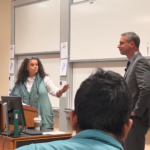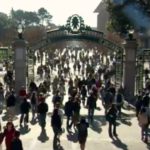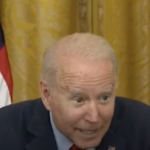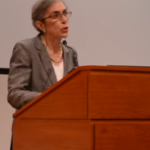The Wesleyan Controversy and a Double Standard for Campus Free Speech
In what is yet more evidence that universities have become, at least where campus free speech is concerned, “islands of repression in a sea of freedom,” as Chester E. Finn Jr., a former Assistant Secretary of Education has described them, the Wesleyan University community has been undergoing collective apoplexy over an opinion submission in the school’s student newspaper, The Argus, which critically examined the Black Lives Matter movement. The thoughtful, relatively-benign op-ed, written by sophomore Bryan Stascavage, a 30-year-old Iraq veteran and self-described “moderate conservative,” questioned if the behavior of some BLM supporters “cheering after [a police] officer is killed, chanting that they want more pigs to fry like bacon” showed a moral and ideological flaw in the movement, leading him to wonder, “is the movement itself actually achieving anything positive? Does it have the potential for positive change?”
That opinion was apparently more than many of the sensitive fellow Wesleyan students could bear, and the newspaper’s staff was inundated with denunciations of the implicit racism of the offending op-ed and the “white privilege” demonstrated by its author, demands that apologies be issued by the paper’s editors, the widespread theft of The Argus around campus, calls for sensitivity/social justice training for staffers, and even a vote to halve the Argus’s annual funding to instead subsidize alternate publications, presumably for marginalized students.
The shell-shocked editors even published a front-page apology for having run the piece in the first place, cravenly caving to the sensibilities of the campus crybabies and saying they understood “the frustration, anger, pain, and fear that members of the student body felt in response to the op-ed ‘Why Black Lives Matter Isn’t What You Think.’” More tellingly, they wrote, “in light of the Black Lives Matter op-ed, students of color may not feel comfortable [emphasis added] or welcome writing for The Argus. Of course, feeling “comfortable,” feeling “safe,” not being offended is now expected as a right on university campuses, where administrators, faculty, and students widely give lip service to the notion that academic free speech should have no limits, but continue to demonstrate that, in practice, free speech on campus relates only to accepted views by self-identified victim groups and not politically heterodox ideas such as the thesis of Stascavage’s op-ed.
When political correctness first began to engulf our campuses, of course, the legacy of Marxist philosopher Herbert Marcuse and his notion of “repressive tolerance” meant that racist or “hateful” speech was attacked as just that: speech which was unacceptable to those “victim” groups who were perceived as needing protection from freely-expressed opinions, —generally members of racial, ethnic, or sexual minorities. College students have therefore taken a new, misguided approach in their attempt to suppress speech whose content they do not approve of, as they seem to have done at Wesleyan. On college campuses, to paraphrase George Orwell, all views are equal, but some are more equal than others.
To illustrate how a double standard exists in the academy as it relates to academic free speech one only has to look at other opinion pieces that have appeared in the self-same Argus, such as a March 2015 column written by members of Students for Justice in Palestine (SJP), a corrosive, anti-Israel group, who published an op-ed with the mendacious title, “Israel’s Apartheid State.”
In the op-ed, written as the annual anti-Israel hate fest known as Israeli Apartheid Week was about to get underway at Wesleyan and campuses around the country, Israelis, and those Jewish students and other pro-Israel individuals on campus who support Israel, are described by the writers as racists, oppressors, ethnic cleansers, thieves and appropriators of Palestinian land, participants in “state terror,” colonial settlers, and aggressive militants who randomly and barbarically initiate “wars against Gaza” while slaughtering innocent Arabs in violation of international law, seemingly without motivation or justification.
While the Argus editors, in their extensive apology for the BLM op-ed, claimed that the writer had “twisted the truth” and misrepresented facts in making his argument, and that they felt editorial responsibility for not fact-checking the piece, in fact the op-ed did not wildly distort facts or misrepresent the recent history of the Black Lives Matter movement, at all. Readers who denounced the piece did not like the motives of a victim group being critiqued and deconstructed by someone who questioned the morality of the movement itself, particularly a white writer. But one could just as easily, and perhaps more relevantly, ask why the editors had not employed that same editorial scrutiny when they agreed to publish the libelous piece by the SJP members in March, an opinion piece whose main message was built upon an analysis that was fraught with untruths, distortions of history and fact, libelous assertions about political behavior and military operations, and a view of the Israeli/Palestinian conflict that disingenuously assigns all of the blame on Israel and ignores Arab rejectionism and truculence, not to mention terrorism, in the decades-long assault on the Jewish state.
Specifically, there is no institutionalized apartheid in Israel, as any sentient observer knows, yet both the title and the main thrust of the piece repeatedly assert that Israel is practicing apartheid against the hapless Palestinians, and that, in the writers’ view, “apartheid is a useful and accurate term to describe the myriad mechanisms of oppression and separation employed by the Israeli state.” As part of that apartheid system, they wrote, “Israel has . . . erected a 30-foot high concrete wall that snakes through the West Bank, annexing more Palestinian land, cutting farmers off from their farmland, and effectively separating the populations based on race,” a liberal fantasy that the barrier was constructed to keep “brown” Arabs out of “white” Israeli neighborhoods that attempts to frame this conflict as a conflict between races, and ignores the reality that the barrier was built, not as a way of segregating neighborhoods, but to keep Israeli civilians from being murdered by terrorists.
In the analysis by the SJP members, of course, there was never any blame on the Palestinian side, characteristic of those who exonerate Third-world victims of imperialism of any blame for the terror and aggression that animates the Palestinian cause. Israel, they write, “continues its inhumane blockade on the Gaza strip [which] has prevented everyday necessities from entering and Palestinians from leaving,” completing ignoring the fact that every Israeli left Gaza in 2005 so the Palestinians could start their state building, and that, instead, Hamas turned Gaza into a launching pad for rockets and mortars, some 12,000 of which have rained down on southern Israeli towns from terrorists wishing to kill Jews in homes, schools, and cafes. There is no mention in the op-ed of these deadly attacks on Israel by Hamas, nor the fact that each rocket launched against Israel amounts to a war crime; and the writers’ statement that “from time to time, guised as counter-terrorism, the Israeli government launches wars against the population of Gaza” describes with absolutely no context the reason why Israel’s incursions into Gaza were necessary in the first place—not, as the writers would have you believe, because Israel capriciously “launches wars,” but as part of a defensive campaign to suppress deadly rocket from Gaza aimed at murdering Israeli citizens.
Another equally disingenuous SJP October 19th op-ed in The Argus, “Occupation Breeds Violence, Free Palestine,” written as Palestinian murderers were stabbing, shooting, and driving over Israeli citizens in a month-long wave of terror, remarkably assigned the blame for the recent carnage, not on the psychopaths who are perpetrating it, but on its victims, asserting that “SJP not only condemns terror, we go further by condemning the primary engine of the ‘recent surge in violence’: Israel’s illegal military occupation of the West Bank.” More ridiculously, they claim, not the terrorists who slaughter civilians but the so-called occupation is the cause of the current violence, and “’the occupation is the ultimate terrorist infrastructure,’” establishing a false moral equivalence between terrorists and Israeli forces trying to protect its citizenry from being killed. Even more Orwellian is their assertion in the piece that even if Israel seeks a negotiated peace, that effort is disingenuous and is aimed at neutralizing the Palestinian’s right to conduct an Intifada. “Peace . . . is a concept,” they ridiculously asserted, “often invoked by the powerful and wielded against the powerless to suppress resistance,” suggesting that Israel would rather oppress Palestinians than live with them, side by side in peace.
The late Senator Daniel Patrick Moynihan once quipped that “everyone is entitled to his opinion, but not to his own facts,” and the lesson here is that if the Argus editors are serious about excluding opinion pieces that “twist the facts” or distort truth in an effort to make a point, then these pieces by the SJP members would fail that editorial test as surely as the Stascavage op-ed was accused of doing when discussing Black Lives Matter. The SJP pieces were replete with distortions, libels, untruths, and a misreading of history and politics, yet no Jewish students came forward to denounce the editors for having published such an egregiously biased, erroneous piece, no Israel supporters called for defunding the paper for running blatantly propagandistic articles, and no champions of free speech demanded sensitivity training for newspapers staffers so that they could better understand how vilification of the Jewish state and holding it to a standard not demanded on any other nation on earth can rise to the level of anti-Semitism.
None of those actions were launched against the Argus precisely because it would be inappropriate to suppress the opinions of the SJP writers—no matter how virulent, incorrect, and misguided—both because it is the legitimate and intended function of the opinion section of a newspaper to run varied, even controversial, ideas, and because it violates the idea of free expression to have one group of self-identified victims dictate what can, and should, be said about matters relevant to them.
So while campus free speech is enshrined as one of the university’s chief principles, the current Argus controversy shows us that it rarely occurs as free speech for everyone, only for a certain few. But if we want speech to be truly free, to paraphrase Justice Oliver Wendell Holmes, Jr., then we have to embrace not only speech with which we agree, but also that speech with which we disagree, the speech that we hate.





